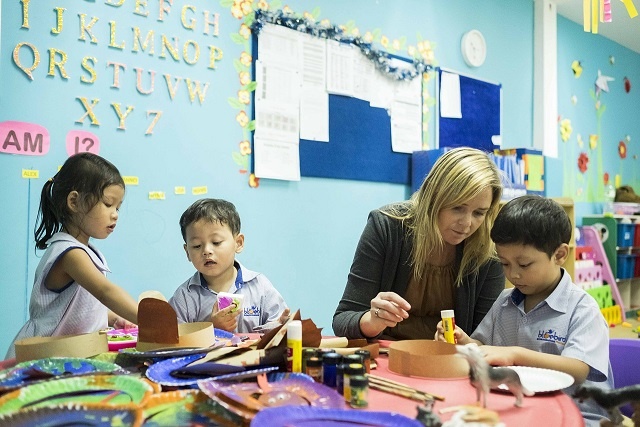
Introduction to Cognitive Development
Cognitive development in early years is a fascinating journey that lays the foundation for how children think, learn, and interact with the world around them. From their first grasp of language to understanding complex concepts, each stage of cognitive growth plays a crucial role in shaping young minds. As parents and caregivers, it’s essential to understand this process and actively engage with it.
During these formative years, children are like sponges; they absorb everything from their environment. This period is packed with exploration and discovery, making it an exciting time for both kids and adults alike. So let’s dive into the intricate world of cognitive development! We’ll explore its stages, factors influencing it, effective activities to nurture it—and much more. Join us on this enlightening adventure that celebrates the incredible potential of young learners!

Stages of Cognitive Development in Early Years
Cognitive development unfolds through distinct stages during early years. Each stage builds a foundation for future learning.
Infants explore their world primarily through sensory experiences. They learn by touching, tasting, and seeing. This exploration is vital for understanding their environment.
As children enter toddlerhood, they start to engage in symbolic play. Language skills blossom here as they begin to communicate thoughts and feelings more effectively.
Preschoolers move into the next phase, where critical thinking emerges. They ask questions about everything around them—an essential part of cognitive growth. Their ability to solve problems also begins to develop significantly at this stage.
By age five or six, kids can grasp more complex concepts such as time and numbers. This newfound understanding sets the groundwork for academic success in later years, making these formative stages crucial for lifelong learning pathways.
Factors Affecting Cognitive Development
Cognitive development can be influenced by a variety of factors. One significant aspect is the child’s environment. A stimulating and nurturing setting encourages exploration and learning.
Nutrition plays a critical role as well. Proper diet supports brain growth, while deficiencies can hinder cognitive functions.
Social interactions also matter greatly. Engaging with peers and adults fosters language skills and problem-solving abilities.
Moreover, genetics contribute to cognitive potential but are not the only determinant. The interplay between inherited traits and environmental influences shapes each individual uniquely.
Access to quality education sets the foundation for cognitive advancements in early years too. Early exposure to diverse experiences enhances curiosity and creativity.
Emotional well-being cannot be overlooked; stress or trauma can impede healthy cognitive development significantly, making it essential for caregivers to provide a safe space for children to thrive.
Activities and Strategies for Promoting Cognitive Development
Engaging children in play is a powerful way to enhance cognitive development. Activities like building blocks or puzzles stimulate problem-solving skills and spatial awareness.
Reading together opens up new worlds. It encourages language acquisition and comprehension, both crucial for cognitive growth. Choose diverse stories that spark curiosity.
Arts and crafts unleash creativity while fostering fine motor skills. Simple activities like drawing or painting help kids express themselves in unique ways.
Nature walks offer rich experiences too. Observing the environment can ignite questions about the world around them, promoting critical thinking.
Incorporate games that require strategy, such as memory games or board games. These teach planning and decision-making in an enjoyable format.
Encourage open-ended questions during conversations to promote deeper thinking and reasoning abilities without fear of being wrong. This nurtures a love for learning that lasts a lifetime.
The Role of Parents and Caregivers in Cognitive Development
Parents and caregivers play a pivotal role in shaping cognitive development during early years. Their interactions, routines, and environment significantly influence how children learn to think, solve problems, and understand the world around them.
Every moment spent reading together or engaging in imaginative play fosters curiosity. These activities stimulate brain connections essential for learning.
Moreover, responsive communication is key. Listening to children’s ideas and asking open-ended questions encourages critical thinking skills that last a lifetime.
Creating a rich environment filled with varied experiences also matters. Exposure to diverse situations helps children adapt their thinking processes.
Emotional support lays the groundwork for confidence in exploration. When children feel secure, they are more likely to take risks in learning new concepts without fear of failure.
Common Myths about Early Childhood Education and Cognitive Development
Many myths surround early childhood education and cognitive development. One common belief is that children only learn through formal instruction. In reality, play-based learning is equally vital for their growth.
Another misconception is that intelligence is fixed at a young age. Research shows that brain plasticity allows for ongoing development throughout childhood and beyond.
Some people think that pushing academic skills too early will yield better results. However, this pressure can lead to stress and burnout in young learners, stifling creativity instead of fostering it.
Additionally, there’s a myth about screen time being entirely negative. While excessive use can be harmful, educational programs can enhance learning when used appropriately and sparingly.
Understanding these myths helps parents make informed choices about their child’s education. Embracing the truth leads to healthier approaches toward fostering cognitive development during those crucial early years.

Conclusion: Importance of Nurturing Cognitive Development in Early Years
Nurturing cognitive development in the early years is critical for laying a strong foundation for lifelong learning. Children are naturally curious and eager to explore their environment, which makes this stage of development incredibly important. Supporting them through various activities helps foster their problem-solving skills, creativity, and critical thinking.
Parents and caregivers play an essential role during these formative years. By providing rich experiences—such as reading together or engaging in imaginative play—they can significantly enhance a child’s cognitive abilities. Creating a stimulating environment encourages exploration and questioning.
It’s vital to be aware of common myths that may hinder progress in early childhood education. Understanding that each child develops at their own pace can alleviate unnecessary pressure on both parents and children.
Investing time and resources into nurturing cognitive growth today will pay dividends tomorrow. As we prioritize these early developmental stages, we set our children up for success not just academically but also socially and emotionally throughout their lives.




Leave a Reply